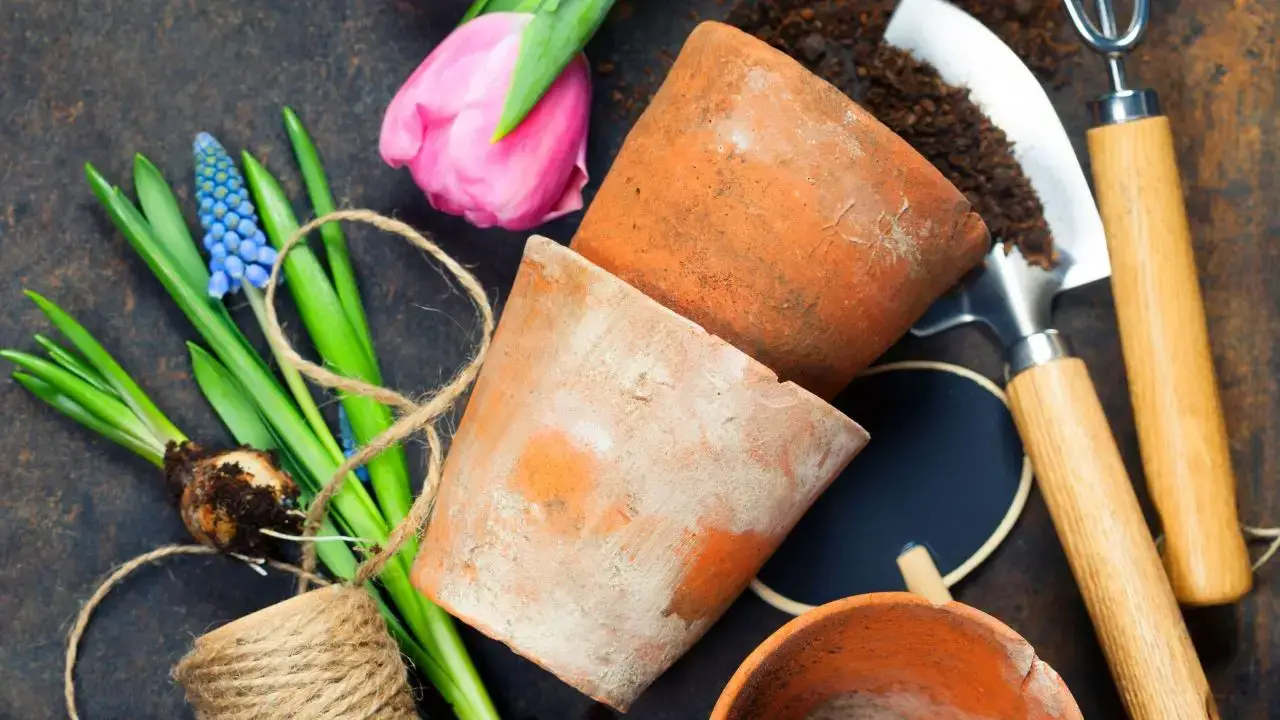White vinegar is a flexible ally in your garden as well as a food necessity. It has several advantages for both your plants and gardening tools, and its uses go well beyond just cooking. Now let’s explore the benefits of using white vinegar in your gardening practice.
Tidy Up Your Clay Pots:

For gardeners with limited space in their kitchen gardens, clay pots provide a useful option that also enhances the aesthetics of the area.
Clay pots are not only aesthetically pleasing, but they also offer a favorable atmosphere for the growth of plants. Clay pots help control soil temperature throughout the sweltering summer months by holding onto moisture, which creates ideal circumstances for plant health.
But over time, water absorption, fertilizer residue, and mineral buildup can cause ugly stains in clay pots. Fortunately, a straightforward but efficient method for bringing them back to their former splendor is revealed: white vinegar.
The following procedures will help you clean your clay pots properly:
1.In a tub or basin, mix one cup white vinegar with three to four cups water to create a cleaning solution.
2.Put your soiled pots in the vinegar-water mixture and leave them to soak for twenty to thirty minutes. Consider adding more vinegar if the discoloration is particularly difficult to remove.
3.Scrub the pots lightly to get rid of any last bits of dirt or mineral deposits after soaking.
4.Use fresh water to completely rinse the pots.
5.Use a dishwasher or hand wash the pots with a little soap for extra cleaning.
White vinegar is a useful tool for keeping a healthy garden as well as a household necessity. White vinegar has several advantages for your outdoor area, including repelling weeds and keeping pests away. Let’s look at some creative ways you can use it in your garden:
2. Weed Management for Walkways, Walls, and Gardens
Weeds can easily take over your garden, robbing your plants of essential nutrients. Thankfully, there is a chemical-free way to get rid of these invaders: white vinegar. Just put pure white vinegar in a spray bottle and squirt weeds with it. The vinegar will destroy the weeds in 2 to 3 days and bring back the original beauty of your garden, walls, and walkways. Use caution when applying vinegar to your veggies or attractive plants as it could also do harm to them.
3: Repellent for Ants
Even though they are wonderful animals, ants may be a pain in your house and yard. Make an efficient ant repellent spray by mixing equal parts water and white vinegar or apple cider vinegar. Use this mixture to block the entrances to ant hills and other trouble spots.
4:Discourage Unwanted Visitors
Overnight, pests like dogs, cats, and rodents may cause havoc in your garden. Put old clothes on stakes around your garden and soak them in pure white vinegar to ward off these unwanted guests. Your plants will be shielded from any harm by the strong smell of vinegar. In order to keep the garments functional, don’t forget to re-soak them once a week.
5: Spray Insect Repellent
Make a DIY insect repellent spray to combat garden pests. In a spray bottle, combine 70% water, 30% white vinegar, and one tablespoon dishwashing detergent. Use this solution to protect your garden from various insects and maintain the health and growth of your plants.
6: Fruit Trees Without Pesticides
On fruit-bearing trees, fruit flies can cause havoc, but a natural remedy to this issue is white vinegar. Make a concoction of water, sugar, molasses, and apple cider vinegar, then drape it over the impacted trees. Fruit flies will be drawn to the fragrant scent, which will trap them in the container and protect your trees without the use of dangerous chemicals.
7. Encourage Acid-Loving flora
Give your acid-loving plants, including azaleas and rhododendrons, a boost by adding a vinegar-water solution to your landscape. Utilize a cup of white vinegar and three to five liters of water to irrigate your plants. Although the results might not last long, your plants will benefit from an increase in nutrients.
These are just a few methods for utilizing white vinegar’s benefits in your garden to preserve a colorful outdoor area and encourage healthy growth without the use of harmful chemicals.

